June 19, 2009 By WONG SAI WAN
Malaysia, once thought of as the forerunner in the multimedia sector, now lags behind on every front in what is supposedly our future.
A DOZEN years ago, the International Advisory Panel of the Multimedia Super Corridor (MSC) held its inaugural meeting at the Gates Building at Stanford University in Palo Alto, the heart of the US Silicon Valley which was, and still is, the heart of the cyberworld.
Then Prime Minister Datuk Seri (now Tun) Dr Mahathir Mohamad chaired the meeting and the members of the panel represented the who’s who of the electronic world then.
Sun Microsystems boss Scott McNeally was there. So was Acer founder Stan Shih and Sony’s Nobuyuki Idei. Also present were venture capitalist James Barksdale and then Compaq CEO Eckhard Pfeifer and then Cisco Systems CEO (now chairman) John Chambers.
The only one missing was Microsoft head honcho Bill Gates. But Dr Mahathir had met him a year earlier and was to meet him again the day following the meeting.
Everyone was abuzz with Malaysia’s idea of a dedicated area just for the development of the cyberworld – which was then just known as multimedia. All of them wanted a piece of the MSC then.
It was a proud moment to be a Malaysian that week and I was fortunate to be there to witness the whole thing. Dr Mahathir was leading a huge business delegation to the United States to promote the MSC, then thought of by the world as a groundbreaking idea.
The concept of a triumvirate – the people, business and the Government – working in concert to make the MSC a reality sounded so attractive.
The Government also drafted laws to protect the MSC so that it would be a truly free environment that would allow ideas to bloom.
That was then. Along came the Asian financial crisis and the sacking of Datuk Seri Anwar Ibrahim (his black eye and the sordid trial put paid to the pride that was felt all those years ago). We had since been recovering slowly.
Then came last week. I met two Europeans at a golf game – one a Swiss whom I shall call Johann, and the other a French whom I will refer to as Pierre.
The two men are chief executives of multi-national companies with manufacturing plants in Malaysia and the region.
While Johann had arrived in the country less than a month ago, Pierre is a 10-year veteran who has seen Malaysia at its best and worst.
The two noticed me typing away on my Blackberry phone and inquired if I found the device useful. Their question set me off on how my life has changed with the BB (Blackberry for the uninitiated).
From there, our conversation turned to the Internet or more accurately, the lack of it.
The two men spent about 30 minutes bemoaning the lack of speed, and how their lives had been badly affected by the slow speed of Internet services in Malaysia.
“My kids made a video to wish their grandfather happy birthday. It was not a very big file – less than 120 megabytes,” said Pierre.
“It took me more than two hours to upload the file and send it to my brother in France so he can show our father.
“In France, my brother took just 10 minutes to download the same file.”
Johann’s crestfallen face spoke volumes when it came to his turn to tell his sad tale of Malaysia’s Internet services.
“I am so used to our Swiss speed. I only get 30 megabits per second when downloading. Malaysia’s Internet connection is just too slow,” he said.
At this juncture, my patriotism kicked in and I tried to justify the situation to these two Europeans, but after a while I found myself agreeing with everything they said.
There was nothing good I could say about Malaysian cyber connections.
The best I could come out with was to ask them to be patient as the Government had initiated the National Broadband Project and that in a few years the whole of the Klang Valley would be wired up.
Pierre and Johann both gave me that “you got to be kidding” look. The Swiss pointed out that all towns in his home country had put in fibre optics years ago.
“They just dug and dug and wired everyone up. What are you all waiting for?” he asked.
He was “very impressed” when he first came to Malaysia 10 years ago.
“You all then had ADSL lines when we in France were still using dial-ups,” he recalled.
“But what happened? We are now surfing at real broadband speed and not the ‘best service possible’ practice as you have here in Malaysia.
“Johann, if you get 50% of the promised speed in Malaysia, consider yourself lucky.”
The conversation went downhill from there on and all three of us took swipes at the various Internet service providers in Malaysia.
Whatever national pride I had for our cyber venture was shattered in my conversation with Johann and Pierre.
When I got home, I tested my 1-megabit-per-second broadband speed. The result was depressing – the download speed was 406 kilobits per second and upload was 307 kilobits per second. Pierre was right – I could not even get 50% of the speed promised.
On Tuesday, Science, Technology and Innovation Minister Datuk Dr Maximus Ongkili will be a guest on The Star Online Live Chat programme.
He can be sure that although I will be away in Sweden attending a global conference by Ericsson on the future of the communication world, I will be e-mailing him some questions and giving him my opinion of our tortoise-speed Internet connections.
Deputy Executive Editor Wong Sai Wan spends every free time Twitting, and is now totally dependent on his Blackberry to update his Facebook
Subscribe to:
Post Comments (Atom)
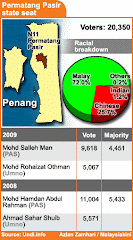

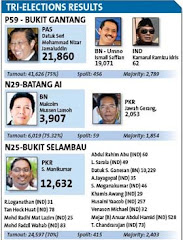

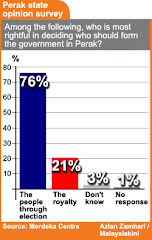
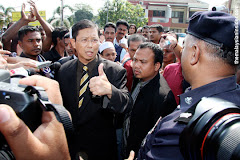
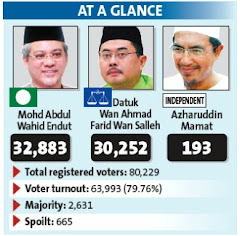


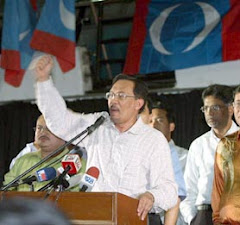
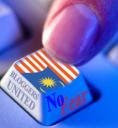
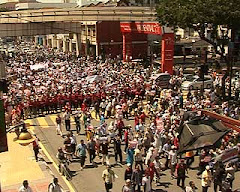







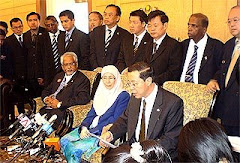
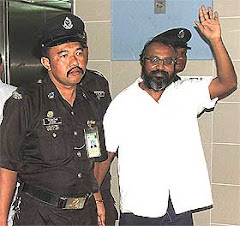
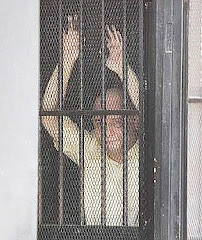


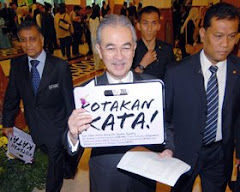
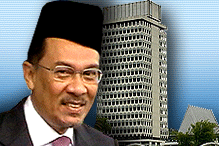
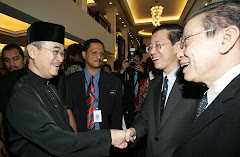






No comments:
Post a Comment